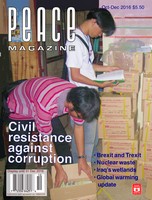
Peace Magazine Oct-Dec 2016, page 19. Some rights reserved.
Search for other articles by John Bacher here
Part of the challenge of building peace in the Middle East is that the powerful synergy between peace, ecology and human rights is relatively weak. Even where democracy is long established in the region, environmentalists are confined to the margins of power. One example is Israel. Green causes are championed only by the Meretz Party, (which normally takes about 6 percent of the popular vote) and by Israel’s even less powerful communists, now forced into a merger with Palestinian parties because of a change in proportional representation laws.
By contrast, Iraq has probably the strongest organized environmental movement in the Middle East. It is integral to the political resurrection of the country’s Shia majority, previously oppressed for hundreds of years under Sunni elite rule—in common with another resurgent political force in Iraq, the largely Sunni Kurds.
Iraq’s environmental movement has its origins in one of the great environmental crimes of the late 20th century—the deliberate draining of Iraq’s great marshes located near the confluence of the Tigris and Euphrates river, to further terrorize and marginalize the Shia community. This resulted in the majority of the 500,000 Marsh Arabs fleeing to Iran.
Long before their conversion to the Shia branch of Islam the Marsh Arabs had created a spectacular, ecologically sustainable civilization in the marshes, going back to the ancient Sumerian culture from which the Abrahamic faiths emerged. It is appropriately revealing of the significance of this region that the scriptural traditions of all three Abrahamic faiths (Judaism, Christianity, and Islam) describe the marshes as the location of the Garden of Eden.
Informed ecologists around the world see the marshes as the “Holy Grail of Wetlands”. They are awed by the diversity of wildlife—such as herons, water buffalo, lions, otters, kingfishers, grebes, and wild boars—in a system more extensive than Florida’s Everglades. It is a resting stop for millions of migratory birds, including flamingos and pelicans, on their travels from Africa to Siberia. It is a refuge for most of the world’s marbled teal ducks and the endangered Basra reed-warbler, the sacred ibis, and the African darter.
The Marsh Arabs’ Sumerian ancestors were able to design an astonishing culture that was able to live in harmony with their wetland environment. They were able to utilize the strength of a native plant, Phragmites, often termed the common reed. Paradoxically, its strength and resilience in North America has caused it to become a harmful, invasive pest. In Iraq, however, it is a pillar of an ecologically diverse wetland ecology. It has been ingeniously adapted by the Marsh Arabs as a construction material, with which to weave beautifully designed buildings.
Schemes to drain Iraq’s wetlands had their origins in the 1950s when the country was still in the UK’s sphere of influence, but for many years, there was powerful opposition to any such program.
The country’s leading hydraulic engineer was an educated member of the Marsh Arab community, Jawad Alwash. His son Azzam, also an engineer, studied at the University of Southern California, earning a doctorate in 1998. He married Suzanne, an environmentalist, and started a family.
Jawad Alwash—who had become a foe of the Ba’athist dictatorship—joined his son’s family in exile in the US. With mounting horror, they followed reports of the regime’s assault on the marshes, which began in 1993. An onslaught of genocide against the Marsh Arabs was unleashed, combined with an ecocidal assault on the wetlands that had shaped their culture for millennia.
Through drainage canals and dikes, the Ba’athist dictatorship destroyed 93 per cent of the Mesopotamian marshes which had once covered an area of 7,700 square miles. Once-productive wetlands became dust bowls, strewn with salt, contaminated with toxins and laced with landmines. Thousands of Marsh Arabs were murdered and their livestock killed. Water sources were poisoned and traditional reed buildings burnt down.
The Alwash family carefully began plans for the resurrection of the Mesopotamian marshes following the ouster of the Ba’athist dictatorship. After the military defeat of the Ba’athist regime in 2003, they were promised support from the US government for their ambitious program of ecological restoration, but their efforts were blocked by the Secretary of Defense, Donald Rumsfeld.
Not to be deterred by Pentagon hostility, the Alwash family returned to Iraq. Their plans were accepted by the Italian occupation authorities, who had been entrusted with governance in the Shia Arab heartland of southern Iraq.
Some Marsh Arabs had been breaking holes in the dykes in a small-scale effort to restore the wetlands. Azzam essentially became an advisor to these groups, to help them select the best locations for breaches. Founding Iraq Nature, the country’s first environmental group, he became “the beggar-in-chief” to secure funding for wetland restoration. This helped obtain funding for excavators to breach large dikes. From 2003 to 2008, Azzam Alwash was able to obtain the restoration of 78 per cent of the Mesopotamian Marshes.
Although Azzam and Nature Iraq are able to work closely with the country’s Environment Ministry, Ba’athist loyalists in alliance with Daesh have attacked his ecological restoration efforts. Terrorist actions have forced Nature Iraq to move its head office—originally in Baghdad—to the more secure Kurdish autonomous area. Here Azzam has become a strong supporter for national unity in Iraq. He explains that the creation of a new Kurdish state would create greater barriers to efforts to restore the Mesopotamian marshes, already harmed by unilateral diversions of water and dams by Turkey and Iran.
Ancient Sumer’s wetland-based way of life was one of the great cradles of civilization, especially for what is usually described as the “western” world. Its Marsh Arab descendants can hopefully become a similar harbinger of environmental concern to the Middle East.
John Bacher is a writer and environmentalist in St. Catharines, Ontario.

Peace Magazine Oct-Dec 2016, page 19. Some rights reserved.
Search for other articles by John Bacher here